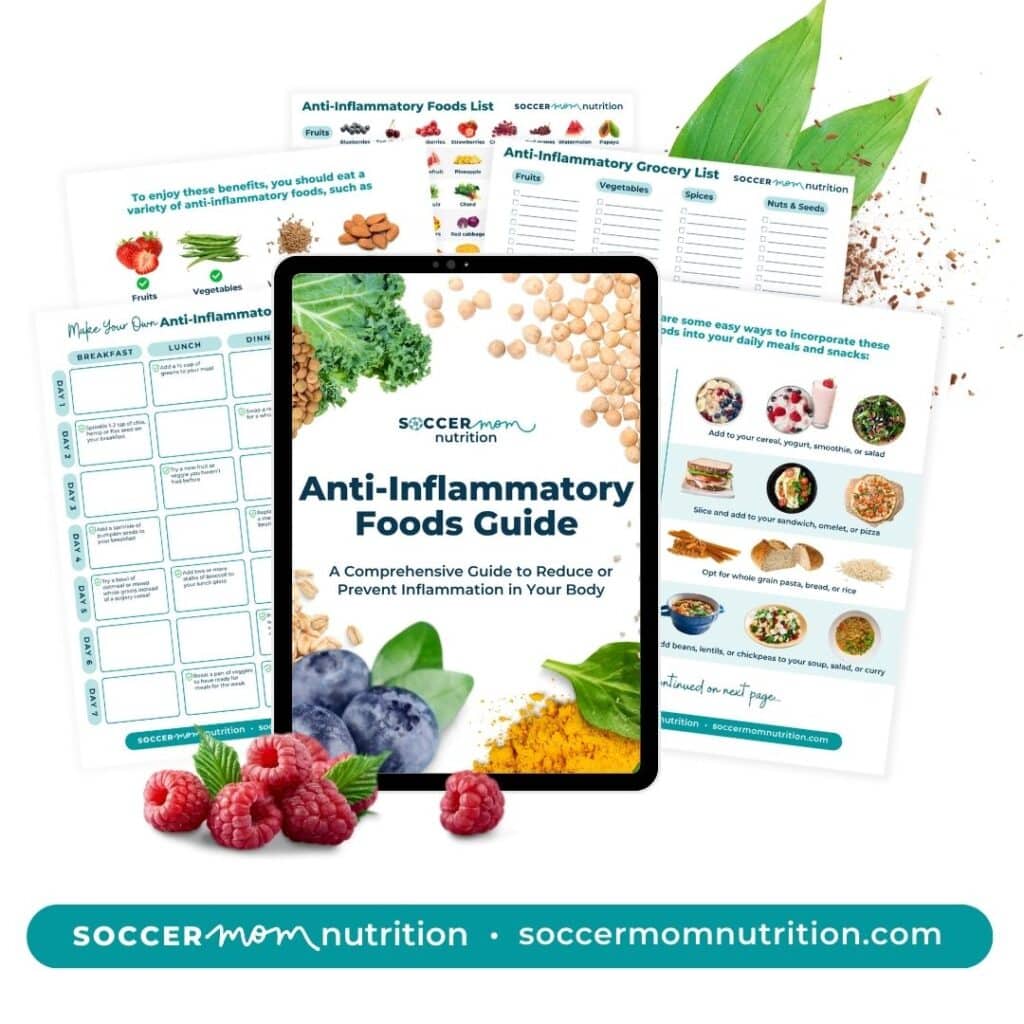25 Anti Inflammatory Foods for Athletes-Guide to Optimize Performance
Unlock the secret to peak performance with my guide to anti inflammatory foods for athletes.
These powerhouse nutrient-rich foods not only reduce inflammation—they’re your secret weapon for stepping up your game and enhancing your overall health.
Keep reading to learn more about how my favorite anti-inflammatory foods and how they can boost your athletic performance.

Please note that this article contains affiliate links. If you click one of these links and make a purchase, we may earn a commission. As an Amazon Associate, we earn from qualifying purchases.
Why should athletes eat anti inflammatory foods?
Eating anti inflammatory foods for athletes can help you to reduce inflammation, which can affect your health and performance.
Inflammation is a natural response of your body to stress, injury or infection. It helps to heal and protect your tissues from further damage.
However, too much inflammation can also be harmful and slow your recovery, increase your risk of injury and impact your immune system.
That’s why it’s essential to for athletes to eat foods that can help to reduce inflammation and promote healing.
What are anti inflammatory foods?
Anti-inflammatory foods are foods that contain nutrients that can help to lower the inflammatory response in your body. Some of these nutrients or compounds are:
Antioxidants
Antioxidants are like superheroes for your body. They help fight off harmful molecules called free radicals, which can cause stress and damage to your cells. By doing so, antioxidants protect your tissues from inflammation.
Omega-3 fatty acids
Omega-3 fatty acids are special fats that your body needs from food because it can’t make them itself. They reduce inflammation by decreasing the production of pro-inflammatory molecules.
Fiber
Fiber is a type of carbohydrate that your body can’t break down, but it’s supports good bacteria in your gut. By promoting the growth of these friendly bacteria, fiber helps improve gut health and lowers inflammation.

25 anti inflammatory foods for athletes
Here are my top picks for the 25 best anti-inflammatory foods for athletes that you can use as the building blocks for your meals or snacks:
1. Fatty fish
Rich in omega-3 fatty acids, fatty fish such as salmon, tuna, mackerel, sardines and herring have powerful anti-inflammatory properties. Omega-3s help reduce exercise-induced inflammation and promote efficient recovery.
They also support brain health, cardiovascular health and joint health. We try to eat salmon at least once a week paired with one other anti-inflammatory foods on this list such as broccoli and sweet potatoes.
2. Tart cherries
Known for their high anthocyanin content, tart cherries have been shown to reduce inflammation, muscle soreness and oxidative stress after intense exercise.
They also contain melatonin, that can help regulate your sleep cycle and enhance your recovery.
Incorporate tart cherry juice into your overall sports nutrition diet. I like to drink the tart cherry concentrate packets after a workout, add tart cherry to a post workout smoothie, or enjoy a cool glass of tart cherry juice.
3. Turmeric
This bright yellow spice is well-known for its anti-inflammatory properties, thanks to its active ingredient called curcumin. Curcumin can stop the activity of various inflammatory molecules and enzymes.
Turmeric can also enhance the absorption of omega-3 fatty acids from food. Add turmeric to your curries, soups, smoothies or teas for a boost of flavor and color.

4. Ginger
Ginger is know for its strong anti-inflammatory and antioxidant properties, thanks to its main bioactive compound, gingerol. It can help alleviate muscle pain and soreness experienced after intense physical activities.
Ginger also supports digestive health and can help reduce nausea.
Incorporate fresh or powdered ginger into your diet by adding it to smoothies, teas, or flavorful dishes for a spicy kick and healthful benefits.
5. Blueberries
Packed with antioxidants and polyphenols, blueberries help fight inflammation, supporting post-workout recovery. Blueberries also contain fiber, which can improve your gut health and lower inflammation.
Add blueberries to your smoothies, yogurt or salads for a burst of flavor and a healthy snack. They’re also my go to oatmeal topping almost every morning to add a hint of sweetness.
6. Leafy greens
Spinach, kale, and other leafy greens are rich in vitamins, minerals, and phytochemicals, offering anti-inflammatory and antioxidant benefits to aid in muscle repair.
They also contain nitrates, which can improve blood flow and oxygen delivery to your muscles.
Add leafy greens to your salads, smoothies, soups or sandwiches for a boost of nutrients and fiber.
7. Extra virgin olive oil
The monounsaturated fats and polyphenols in extra virgin olive oil have anti-inflammatory effects, promoting cardiovascular health and aiding exercise recovery.
These healthy fats also help to lower blood pressure and cholesterol levels.
Use extra virgin olive oil for cooking, dressing or dipping for a healthy and tasty fat source.
8. Almonds
Almonds are packed with vitamin E, magnesium, and healthy fats, all of which have anti-inflammatory properties. Vitamin E acts as a powerful antioxidant, helping to reduce oxidative stress and inflammation in the body.
Almonds can support heart health, muscle recovery, and provide sustained energy for athletes.
Snack on a handful of almonds, add them to oatmeal or yogurt, or use almond butter as a nutritious spread.

9. Beets
The naturally occurring nitrates in beets can help improve blood flow, reduce exercise-induced muscle damage and lower inflammation levels.
They also contain betalains, which are antioxidants that can protect your cells from damage.
Blend beets into your smoothies, juices or soups for a boost of energy and color.
10. Pineapple
Brimming with bromelain, an enzyme with anti-inflammatory properties, pineapple can help alleviate exercise-induced muscle soreness and aid in recovery.
It also contains vitamin C, which can support your immune system and collagen synthesis.
Enjoy pineapple fresh or frozen as a sweet and refreshing snack or dessert.
11. Whole grains
Whole grains like quinoa, brown rice, oats and barley provide fiber, antioxidants and anti-inflammatory compounds that support sustained energy levels and recovery.
They also contain complex carbohydrates, which can replenish your glycogen stores after exercise.
Choose whole grains over refined grains for more benefits and flavor. Some easy ways to sneak in whole grains include high fiber cereal and high fiber bread.
12. Greek yogurt
Probiotic-rich low fat Greek yogurt offers a blend of protein and anti-inflammatory nutrients, aiding in muscle repair and reducing exercise-induced inflammation.
It also contains calcium, which can support your bone health and prevent stress fractures.
Eat Greek yogurt plain or with fruits, nuts or granola for a creamy and protein-packed snack or breakfast. Greek yogurt makes a great chia pudding or overnight oatmeal base, adding a rich creaminess.
We keep a large container of non-fat Greek yogurt in the fridge so we can use it for any snack or meal.
13. Green tea
Green tea contains a powerful antioxidant, has been linked to reduced inflammation, improved exercise performance, and enhanced recovery. Youth athletes should choose green teas without caffeine.
Drink green tea before or after your workouts to gain its benefits.
14. Garlic
Garlic is not only a staple for adding flavor to dishes but also a strong anti-inflammatory and immune-boosting food. It contains compounds like allicin, which have been shown to reduce inflammation and offer antioxidant benefits.
Garlic can be easily added to a variety of meals, from sauces and dressings to marinades and stir-fries, making it both a versatile and essential ingredient for anti-inflammatory nutrition.
15. Dark chocolate
With its flavonoids and antioxidants, dark chocolate can help reduce inflammation, enhance blood flow and promote post-exercise recovery. It also contains magnesium, which can relax your muscles and nerves.
Choose dark chocolate with at least 70% cocoa content and enjoy to satisfy a sweet craving.
16. Avocado
This creamy fruit is a great source of monounsaturated fats, which can lower inflammation and improve cholesterol levels. Avocado also contains antioxidants and vitamin E to support skin health.
Mash avocado on your toast, slice it on your salad or blend it into smoothie for a smooth and satisfying taste.
17. Amino acids
Amino acids are the building blocks of protein, which is essential for muscle growth and repair. Plant based amino acids can also regulate the inflammatory response.
Some amino acids have specific anti-inflammatory effects, such as leucine, glutamine, arginine and glycine.
18. Broccoli
Broccoli is a cruciferous vegetable known for its wealth of nutrients and anti-inflammatory properties. It’s packed with vitamins C and K, various antioxidants, including sulforaphane, a compound shown to reduce inflammation.
When you incorporate broccoli into your diet you get multiple benefits.
Its antioxidant content helps to reduce damage to the cells caused by intense workouts, while its anti-inflammatory effects can aid in reducing joint pain and muscle recovery time.
Additionally, the fiber in broccoli supports digestive health. And the vitamin K helps prevent blood clotting and bone loss.
Broccoli is versatile and can be enjoyed steamed, roasted, or raw in salads. Steam, roast or sauté broccoli for a nutritious and delicious side dish.

19. Peppers
These vibrant vegetables are packed with antioxidants that can reduce inflammation and pain. They also have shown an impact on improving your mood and well-being.
Peppers also contain vitamin C, which can support your immune system and collagen synthesis.
Choose peppers of different colors and shapes for a variety of flavors and nutrients and add to salads, sandwiches and soups.
20. Red cabbage
This colorful vegetable is a great source of anthocyanins, which are antioxidants that can lower inflammation and oxidative stress. Anthocyanins can also protect your blood vessels and improve blood flow.
Red cabbage also contains vitamin C, which can support your immune system and collagen synthesis.
Add red cabbage to your salads, slaws, wraps or tacos for a pop of color and crunch.
21. Chia seeds
Chia seeds are tiny but mighty sources of omega-3 fatty acids, fiber, and antioxidants, making them an excellent anti-inflammatory food for athletes.
Their omega-3s can help reduce inflammation, while the fiber content aids in digestive health.
Chia seeds also provide a good amount of protein and minerals like magnesium, which are beneficial for muscle recovery and energy levels.
Add them to smoothies, yogurt, or make a chia pudding for a nutrient-packed snack or breakfast.
22. Tomato
Tomatoes are a nutritional powerhouse, packed with vitamins C and K, potassium, and an abundance of antioxidants, including lycopene. Lycopene, in particular, is known for its anti-inflammatory properties.
Tomatoes also support heart health and offer protective benefits against certain types of cancers.
Incorporate fresh tomatoes into your salads, sandwiches, or enjoy them as a nutritious snack to harness their anti-inflammatory and health-promoting effects.
23. Sweet Potatoes
Sweet potatoes are not only a great source of complex carbohydrates for energy but also rich in beta-carotene, vitamins C and E, and manganese—all nutrients with anti-inflammatory properties.
Their high fiber content also supports digestive health, making sweet potatoes a nutritious addition to any athlete’s diet.
Enjoy them roasted, mashed, or in a hearty stew for a comforting and healthful meal.
24. Quinoa
Quinoa is a gluten-free grain that’s rich in protein, fiber, and anti-inflammatory phytonutrients.
It’s also one of the few plant foods considered a complete protein, containing all nine essential amino acids necessary for muscle repair and growth.
Quinoa’s high magnesium and B-vitamin content further support energy metabolism and recovery, making it an ideal food for athletes.
Use quinoa as a base for salads, as a side dish, or mixed into breakfast bowls for a nutritious start to your day.
25. Walnuts
Walnuts are a fantastic source of alpha-linolenic acid (ALA), a type of plant-based omega-3 fatty acid, known for its anti-inflammatory effects.
Regularly eating walnuts can help reduce inflammation.
They also contain antioxidants and polyphenols that can further reduce oxidative stress and inflammation.
Snack on walnuts, add them to your salads or oatmeal, like I do, for a nutritious crunch.

FAQs for best anti-inflammatory foods for athletes
What is an anti-inflammatory diet for sports?
An anti-inflammatory diet for sports focuses on eating foods that are known to reduce inflammation within the body.
This diet is especially beneficial for athletes, because it helps to enhance recovery times, improve performance, and maintain overall health.
Key components of this diet include a wide variety of fruits and vegetables (especially leafy greens and berries), healthy fats (such as omega-3-rich fish and olive oil), whole grains, lean protein sources, nuts, and seeds.
By emphasizing these anti-inflammatory foods, you can help mitigate chronic inflammation, reduce the risk of injury, and support your body’s recovery processes.
How do athletes deal with inflammation?
Athletes deal with inflammation through a combination of dietary strategies, proper rest, and physical therapy techniques or medical interventions.
Nutritionally, incorporating anti-inflammatory foods , such as omega-3 fatty acids, tart cherries, leafy greens, fatty fish, and ginger, plays a crucial role.
Adequate hydration and balanced meals also support the body’s natural inflammation response.
Rest is huge; getting enough sleep and incorporating active recovery days helps in managing inflammation. It’s also important to eat well on rest days.
Additionally, work with your athletic trainer, physical therapist or medical provider for ideas to reduce inflammation and enhance recovery, such as ice baths, massage, compression garments, and targeted exercises.
What are 3 best foods to fight inflammation?
These are my top 3 best foods to fight inflammation for athletes.
- Omega-3-rich Fish: Fatty fish like salmon, tuna, mackerel, and sardines are high in omega-3 fatty acids, which have high anti-inflammatory benefits. They help reduce the levels of inflammatory markers in the body, making them invaluable for athletes.
- Tart Cherries: Due to their high anthocyanin content, tart cherries are effective in reducing inflammation and muscle soreness, making them one of the best choices for athletes looking to enhance recovery and performance.
- Leafy Greens: Spinach, kale, and other leafy greens are high in vitamins, minerals, and antioxidants, making them powerful allies in fighting inflammation and promoting overall health.
Final thoughts
Eating anti-inflammatory foods for athletes can help you to recover faster, prevent injuries, boost your immune system and enhance your performance.
Try to include some of these foods in your daily diet to reap their benefits.
However, remember that food is not the only factor that affects inflammation.
You also need to consider other aspects of your lifestyle, such as stress management, sleep quality, hydration and exercise intensity.
By planning ahead and building a grocery list before you shop, you can make sure you don’t miss out on any of these anti inflammatory foods.
Check out our Anti Inflammatory Foods Guide for a comprehensive approach to adding more anti inflammatory foods to your diet.
Always consult with a sports nutrition dietitian before making any dietary changes or taking any supplements.
Join our mailing list and get our FREE Pre-Activity Fueling Guide.
Stephanie Magill, MS, RD, CD, FAND has over 22 years of experience in public health and nutrition. As a performance registered dietitian nutritionist, Stephanie specializes in sports nutrition and provides simple and actionable information so that athletes can be well fueled for high performance on and off the field. Stephanie has a Master’s Degree in Nutrition and is a Fellow of the Academy of Nutrition and Dietetics.

